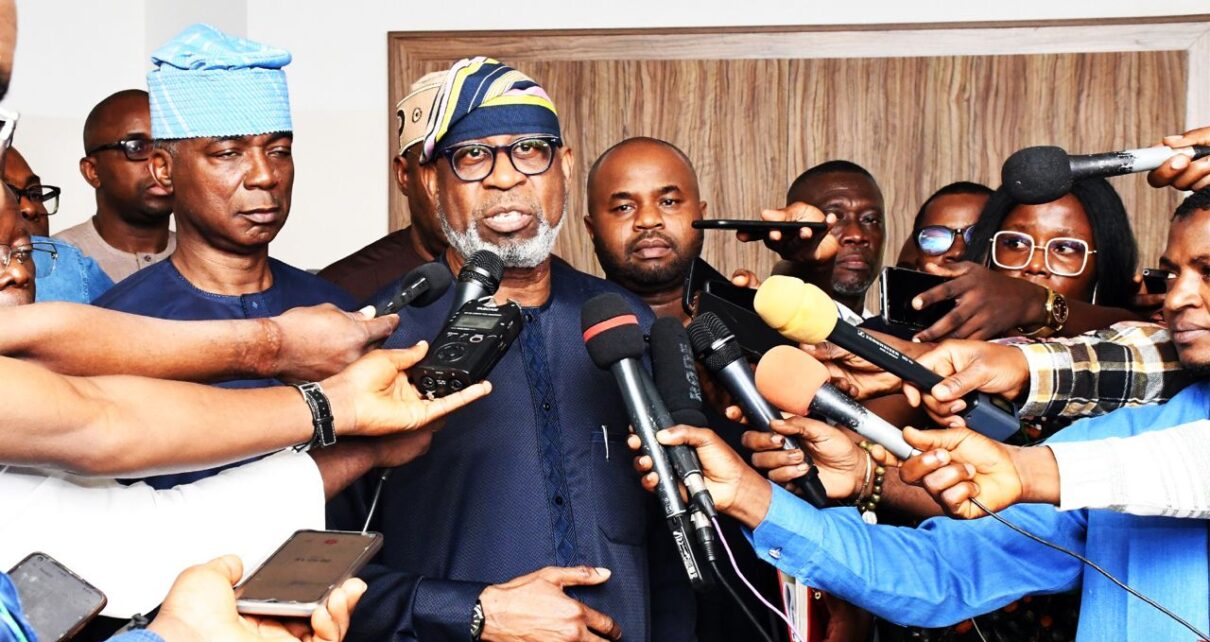The Federal Government has said talks with organized Labour regarding the fuel subsidy removal will be concluded on Tuesday.
Dele Alake, spokesman on behalf of the Federal Government, told State House correspondents after a meeting between the government side and Trade Union Congress (TUC) at the Presidential Villa, Abuja, on Sunday.
Recall that the meeting held with Organised Labour made up of the Nigerian Labour Congress (NLC) and the TUC on the same matter last Wednesday was deadlocked.
The federal government’s team was being led by the Secretary to the Government of the Federation (SGF), Senator George Akume. Others are the Governor of the Central Bank of Nigeria (CBN), Godwin Emefiele; the Group Chief Executive Officer of the Nigerian National Petroleum Company Limited (NNPCL), Mele Kyari, and a former Governor of Edo State, Comrade Adams Oshiomhole.
Also in the meeting were the Executive Secretary of the National Sugar Development Council (NSDC), Zacch Adedeji; Executive Vice President, Downstream, NNPCL, Yemi Adetunji; former Lagos State Commissioner for Information and Strategy, Mr Dele Alake, and Hon. James Faleke, among others.
On the TUC side were seven members, led by its President, Festus Osifo.
Meanwhile, the NLC was absent at the Sunday’s meeting.
After the meeting on Sunday night, Alake announced that the meeting had been highly productive, with the TUC presenting a list of demands which the government was now studying for further consideration.
Alake stated, “We can announce to Nigerians that a lot of the items on the list are not impracticable. What we need to do is to study the numbers very well.”
He further emphasised that the government had requested a leeway to consult extensively and reconvene on Tuesday to thoroughly analyze the numbers, viability, and practicability of the demands.
Among the demands put forward by the Labour movement, the foremost priority is the issue of the minimum wage, which they argued is a consequential impact of the subsidy removal.
Alake assured that the government was taking this matter seriously and intends to establish a tripartite committee consisting of representatives from the federal government, state authorities, Organized Labour, and the private sector.
He said the committee will assess the dynamics of wage increase percentages, the categories of workers affected, and other related factors.
Regarding the timeline for setting up the committee, Alake expressed optimism, saying, “Very, very soon. We are going to meet Mr. President now, and he is going to take an immediate decision.”
He reaffirmed the President’s commitment to reviewing the minimum wage as previously reported.
While Alake did not disclose all the demands on the list of Labour, he stressed that the most crucial demand was the increase in the minimum wage.
He said the removal of fuel subsidy has led to an immediate impact on workers’ purchasing power due to the rise in fuel prices, and addressing this concern was of utmost importance to the government.
Responding to questions about negotiations with NLC, Alake clarified that efforts were being made to reach them.
Although the NLC was not present at the meeting, Alake assured that NLC was not being isolated, and the government remains open to engaging with them.
When asked about accusations made by Bayo Onanuga regarding the NLC pandering to the wishes of the LP presidential candidate, Mr Peter Obi, Alake dismissed it as irrelevant to the discussions on workers’ welfare.
He emphasised that the focus was solely on mitigating the impact of subsidy removal on workers, and not on political partisanship.
On the possibility of shelving the planned strike by NLC, Alake confirmed that the matter had been discussed, and further deliberations would take place during the next meeting on Tuesday.
He said concrete decisions were expected to be reached at that time.
Regarding the demand to revert to the status quo, Alake stated that it had been considered, taking into account its practicability and viability.
“However, a final decision on this matter will be made during the next meeting,” he said.
Meanwhile, the TUC President, Festus Osifo, expressed his optimism for a positive outcome as the demands of Nigerian workers were being considered by government.
Osifo stated that the TUC did not agree with the government’s offerings. Instead, they decided to consult their respective organs before further negotiations could take place.
The TUC subsequently called a meeting of its National Executive Council (NEC) on Friday to discuss the government’s proposals and formulate their own demands.
During the NEC meeting, the TUC’s leadership was mandated with a comprehensive list of demands, addressing issues such as the minimum wage.
Osifo highlighted that the current minimum wage in Nigeria falls significantly short of providing a living wage, and called for a review to rectify this dire situation.
He said both parties acknowledged that further consultations were necessary before final decisions could be made.
He said the government officials expressed their need to consult with President Bola Tinubu which led to a decision to reconvene on Tuesday.
Osifo confirmed that the TUC presented their list of demands to the government, who received it with goodwill.
He expressed hope that the demands would be reviewed in the best interest of Nigerian workers and the entire population.
When asked about the absence of the Nigeria Labour Congress (NLC) at the meeting, Osifo emphasised that each organization has its own internal decision-making processes.
He stated that the TUC and NLC are separate entities, and the TUC is implementing the decisions made by their NEC.
Regarding concerns about a possible rift between the TUC and the NLC, Osifo called on the press to help educate Nigerians about the nature of organizational decision-making.
He emphasised that the decisions of the respective organs are binding on their leadership.
